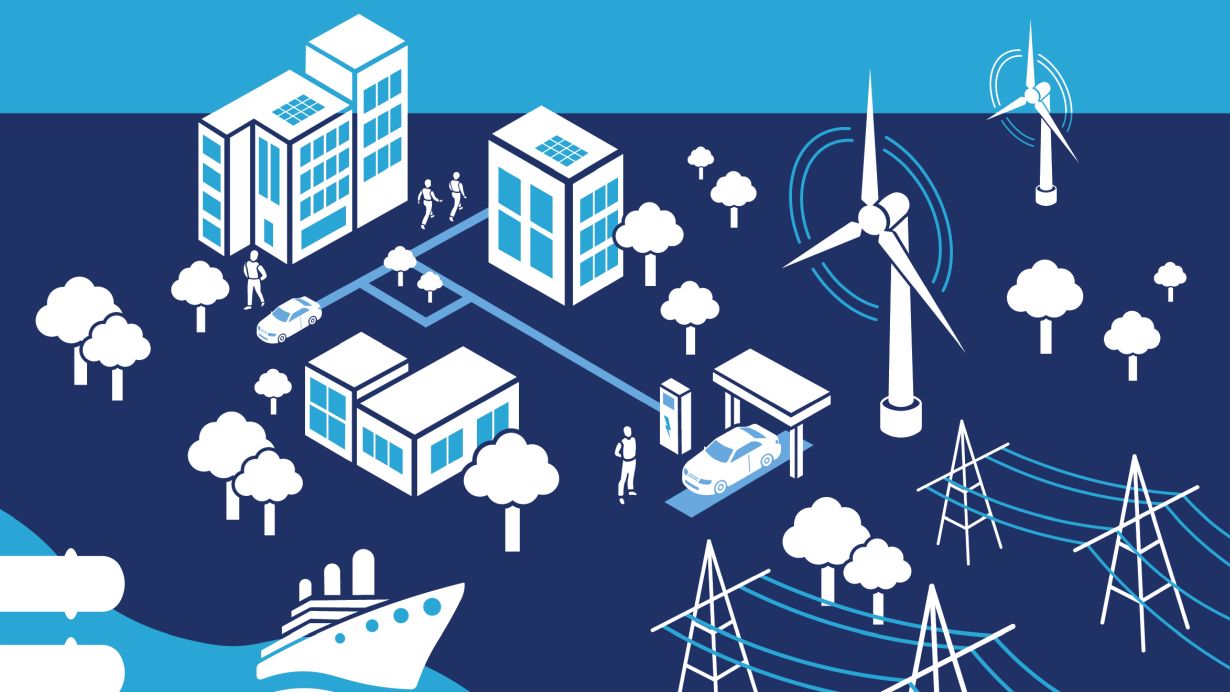News 2025
 December 2025: Practice-oriented Teaching - New Lecture on Smart Resilience Technologies December 2025: Practice-oriented Teaching - New Lecture on Smart Resilience TechnologiesDigital decision-making technologies play a crucial role in ensuring the resilience of critical infrastructures, as overall complexity increases with rising climatic, digital and geopolitical risks and growing interconnectedness. To prepare future professionals for these challenges, KIT and the technology company SAP have jointly developed the lecture “Smart Resilience Technologies”. The focus is on adaptation strategies for complex transformation processes. Learn more |
 OSMSES 2026 in Karlsruhe: Call for Papers open OSMSES 2026 in Karlsruhe: Call for Papers openThe 4th International Workshop on ”Open Source Modelling and Simulation of Energy Systems” will take place in |
 November 2025: Education and Research – Going Hand in Hand November 2025: Education and Research – Going Hand in HandAs part of the Helmholtz Association, KIT operates numerous infrastructures for large-scale research tasks that are unparalleled in the German higher education and science system. In order to strategically integrate this strength into teaching, KIT launched the RIRO – Research Infrastructures in Research-Oriented Teaching University of Excellence project seven years ago. A unique opportunity for students – and researchers. The ESD program is also participating in RIRO with SEnSSiCC and LLEC @ EnergyLab. Learn more |
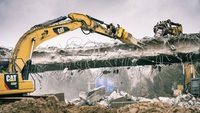 November 2025: The German Cement Industry's Transition November 2025: The German Cement Industry's TransitionA Nexus of Energy, Environmental Policy, and Decarbonization Pathways. Achieving Germany's 2045 climate goals requires a radical shift in the cement indstry. A multi-pronged approach is essential. Learn more |
 November 2025: Tomorrow's heating requirements – planned based on data November 2025: Tomorrow's heating requirements – planned based on dataResearch is being conducted into how large-scale full electrification using heat pumps, rooftop PV, battery storage, and energy management will affect the grid electricity demand of Germany's residential building stock. The study will examine which building characteristics have an influence and what potential and challenges may arise for end customers and grid operators in Germany. Learn more |
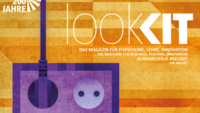 lookKIT 2025/2: Energy for the Future lookKIT 2025/2: Energy for the FutureThe growing global energy demand, resource limitations, and climate change require urgent innovation in energy supply. As part of Science Year 2025 — Energy of the Future, KIT researchers present forward-looking solutions such as advanced solar cells, fossil-free mobility, alternatives to lithium-ion batteries, and the potential of nuclear fusion. This issue of lookKIT explores these technologies and their role in shaping a sustainable energy future. lookKIT 02/2025 |
 May 2025: Future cost-efficient and socially acceptable energy systems May 2025: Future cost-efficient and socially acceptable energy systemsThree research groups of Jann Weinand are working to provide a sound basis for decision-making for politics, business and society in order to shape the energy transition in a targeted, resource-conserving and socially acceptable way. Find out more about their work. Learn more (in German) |
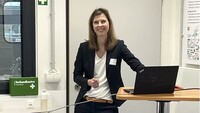 May 2025: Portrait of Christina Wulf (FZJ) May 2025: Portrait of Christina Wulf (FZJ)Christina Wulf heads the Sustainable Life Cycles team at the Research Centre Jülich. The focus of her work is on the Life Cycle Sustainability Assessment of hydrogen and Power-to-X technologies. Christina Wulf completed her doctorate at the University of Hamburg and joined the Jülich Research Centre as a postdoc in 2015. Since 2023, she has headed her own research team. Learn more (in German) |
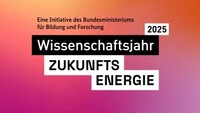 May 2025: Contribution to Science Year 2025 - Data-driven analysis of the energy system May 2025: Contribution to Science Year 2025 - Data-driven analysis of the energy systemBenjamin Schäfer's research group DRACOS at KIT investigates complex energy systems based on extensive data (big data). The research focuses on the development of new transparent AI models which, in contrast to so-called black box models, not only show the result, but also explain which factors influence the result. Benjamin Schäfer describes his research in the following profile. Learn more |
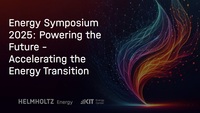 Energy Symposium 2025 Energy Symposium 2025KIT Energy Center and Helmholtz Energy are looking forward to welcome you to the Energy Symposium 2025 which will take place at KIT from June 24 to 27, 2025. With the focus on “Powering the Future - Accelerating the Energy Transition”, the Energy Symposium 2025 offers over 250 participants from international research institutions and Helmholtz Energy the opportunity to meet and build new connections in energy research. Learn more |
 April 2025: Trees Make Cities More Climate-resilient and People Happier April 2025: Trees Make Cities More Climate-resilient and People HappierGreen spaces play an important role for urban populations, whether by protecting against extreme weather events or providing space for recreation. In two studies, researchers at the KIT show just how much a diverse tree population affects microclimate, rainwater seepage and human well-being. Their results have been published in the journals Sustainable Cities and Society and Scientific Reports. Learn more |
 March 2025: Smart Energy Management at Home March 2025: Smart Energy Management at HomePhotovoltaic systems, battery storage units, and electric vehicles – private households are increasingly turning towards economical and climate-friendly technologies. However, the full potential of these technologies, can only be unleashed in combined use. RAZO Energy, a start-up founded at KIT, provides an intelligent energy management system that links energy sources and building technology, optimizes self-consumption, and increases overall efficiency. Learn more |
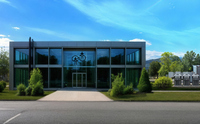 March 2025: The "Go" has been given for the High Power Grid Lab March 2025: The "Go" has been given for the High Power Grid LabBy 2030, the High Power Grid Lab (HPGL) in the Energy Lab will be a globally unique test environment for researching the system behavior of new grid technologies such as power converters for medium-voltage direct current grids under realistic conditions. Already in its development phase, the HPGL at KIT is an international transfer hub for knowledge and technology in practical applications. Learn more (in German) |
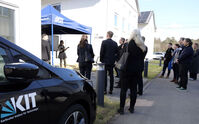 March 2025: Insights into the Review March 2025: Insights into the ReviewFrom March 10 to 13, 2025, the scientific evaulation of the Helmholtz Research Field Energy took place at KIT. The Helmholtz Program Energy System Design (ESD) was also assessed. Innovative approaches for the sustainable transformation of the energy system were presented. Learn more about the research on effective and socially feasible transformation paths, digitalization and system technology, as well as the activities during the evaluation. Learn more |
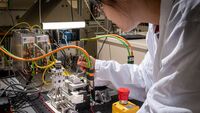 March 2025: KIT at the Hannover Messe 2025 - Energy and Commitment for the Future March 2025: KIT at the Hannover Messe 2025 - Energy and Commitment for the FutureFrom integrated photovoltaics to optical metasurfaces to smart headphones – from March 31 to April 6 at the Future Hub and at the Energy Solutions. ESD topics will also be presented at the booths. Learn more (in German) |
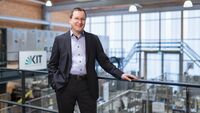 February 2025: Understanding the energy transition - How models shape the future February 2025: Understanding the energy transition - How models shape the futureHow does scientific modeling influence the energy transition and thus our future? Models and their representation determine our thinking, but their foundations often remain invisible. The transdisciplinary research project “Poetics of Models” at KIT is investigating how we shape the future with energy transition models - and how we can communicate them more comprehensibly. Funded as a Reinhart Koselleck project by the German Research Foundation (DFG), it questions modeling practices in order to strengthen transparency, participation and inclusion in the transformation of the energy system. Learn more (in German) |
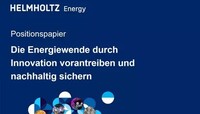 January 2025: Helmholtz Energy position paper on the energy transition January 2025: Helmholtz Energy position paper on the energy transitionThis paper contains our key findings for the transition to a climate-neutral energy system. These are based on Helmholtz Energy's extensive research on this topic, partly on the ESD policy brief. With this paper, we provide a brief overview of the most important measures and provide guidance for all interested parties. Learn more (in German) |
News 2024
_rdax_200x112s.jpg) November 2024: Energy Transition - The Long Road to Energy Security November 2024: Energy Transition - The Long Road to Energy SecurityIn a crisis-stricken world, the connection between energy and security policy is coming to the fore. Renewable energies promise greater independence from resource-rich countries and are key to mastering the energy transition and thus to achieving the climate targets enshrined in law: Reducing CO2 emissions and achieving greenhouse gas neutrality by 2045. Learn more |
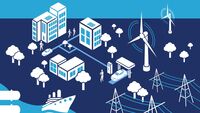 October 2024: How the Energy Transition Can Succeed October 2024: How the Energy Transition Can SucceedGermany wants to complete its energy turnaround by 2045. Researchers from ESD outline how a sustainable transformation of the energy system can be achieved. In a "Policy Briefing", the scientists analyse possible future scenarios, taking into account ecological, economic, institutional, organisational and social aspects. Learn more |
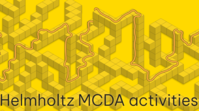 October 2024: MCDA at Helmholtz October 2024: MCDA at HelmholtzWithin ESD, a Helmholtz Working Group on MCDA for Sustainability Assessment is active. Our mission is to advance the use of multi-criteria decision analysis (MCDA) for supporting the transformation of energy systems. We provide a collaborative platform for researchers, fostering the development and dissemination of innovative methods and approaches in MCDA for sustainability assessment.The webpage is now online. Learn more |
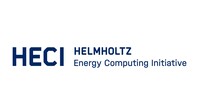 October 2024: Helmholtz Energy Computing Initiative - Webpage online October 2024: Helmholtz Energy Computing Initiative - Webpage onlineThe Helmholtz Energy Computing Initiative (HECI) collects models, software tools, and data sets developed by members of the Helmholtz Association in order to make them available to the research community and the public in an organized manner. The HECI webpage is now online. Learn more |
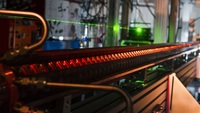 August 2024: Project RF 2.0 - Research for More Sustainability in Particle Accelerators August 2024: Project RF 2.0 - Research for More Sustainability in Particle AcceleratorsResearch Facility 2.0 is an EU-funded research project aimed at making the operation of particle accelerators and other large-scale facilities more resource-efficient. The KITTEN test center at KIT plays a central role in the RF 2.0 project: It hosts researchers that are working on the analysis of important parameters and the development of realistic demonstrators. Learn more |
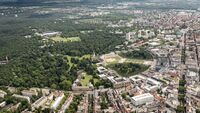 July 2024: Multi-Talented Urban Trees - Healthy Trees for a Better Quality of Life July 2024: Multi-Talented Urban Trees - Healthy Trees for a Better Quality of LifeThey cool and clean air, boost biodiversity, and support recreation: Trees in cities contribute in many ways to the well-being of the city people. In the URBORETUM innovation cluster, researchers from KIT are working with partners to find out what is needed to ensure that urban trees can provide their “services” even in times of increasingly extreme climatic conditions. Learn more |
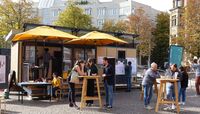 July 2024: More Inclusive Ways of Citizen Participation July 2024: More Inclusive Ways of Citizen ParticipationKIT researchers show how real-world labs with a mix of digital and face-to-face forms of participation can reach more people than before. Learn more |
 July 2024: Microgrids - Resilient City for Everyone July 2024: Microgrids - Resilient City for EveryoneKIT researchers have developed a model that takes into account the fair design of decentralized energy systems. Learn more |
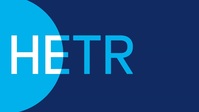 July 2024: Helmholtz Energy Transition Roadmap published July 2024: Helmholtz Energy Transition Roadmap publishedHelmholtz Energy has published the Helmholtz Energy Transition Roadmap (HETR). Well over 100 researchers from the entire research field have contributed to this roadmap for energy research. In a final step, feedback from stakeholders from industry, politics and science outside of Helmholtz research was integrated into the version now published. Learn more |
 June 2024: Action day - How can transformation succeed? June 2024: Action day - How can transformation succeed?With mini-workshops, a keynote speech and a World Café, the action day on June, 21st, offers plenty of inspiration on how you can actively shape the future. Meet people who, like you, are asking themselve: "How can I contribute to sustainable transformation?". Discover what you can do and why the transformation needs you. Learn more (in German) |
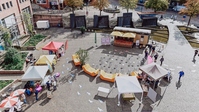 June 2024: With Real-World Labs Into the Future June 2024: With Real-World Labs Into the FutureKIT's Real:lab Festival invites you to experiment in and with the city: Whether robots in care, autonomous vehicles in road traffic or a more sustainable urban development: the real-world laboratories at KIT bring science and society together to jointly test and shape the future. At the Real:lab Festival from 2 to 6 July 2024, anyone interested can experience for themselves what real-world laboratory research is all about and how they can get involved. Learn more |
 May 2024: New from Old: How Concrete Can Be Recycled May 2024: New from Old: How Concrete Can Be RecycledProduction of concrete is one of the main sources of industrial greenhouse gas emissions. The “Zero-emission Circular Concrete” project at KIT aims to limit them. Learn more |
 April 2024: Scientist of the month - Patrick Jochem (DLR) April 2024: Scientist of the month - Patrick Jochem (DLR)Patrick Jochem has headed the Department of Energy Systems Analysis at the Institute of Networked Energy Systems at the German Aerospace Center (DLR-VE) since 2020 and has been an adjunct professor at the Institute for Industrial Production at the Karlsruhe Institute of Technology (KIT-IIP) since March 2024. In our interview, Patrick Jochem provides insights into his research. Helmholtz Interview |
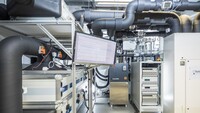 February 2024: Technical report on flexibility potentials and solutions February 2024: Technical report on flexibility potentials and solutionsESD scientists of Topic 2 "Digitalization and System Technology" published a joint technical report on the flexibility potentials and solutions of buildings, districts, transport, and energy-intensive industries. Technical report |
 January 2024: Blueprint for the Urban Energy Transition January 2024: Blueprint for the Urban Energy TransitionThe Smart East real-world laboratory with KIT participation draws a successful balance and will be continued in the new EU project WeForming. Learn more |
News 2023
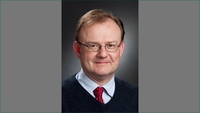 In Memoriam In MemoriamWe mourn the loss of Professor Dr.-Ing. Robert Stieglitz, who passed away suddenly and unexpectedly at the age of 58. Robert Stieglitz was appointed Head of the Institute of Neutron Physics and Reactor Technology in 2009. Further information |
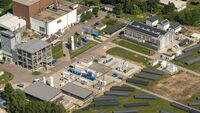 December 2023: Energy transition in municipalities December 2023: Energy transition in municipalitiesAs the smallest administrative units, local authorities can make a significant contribution to implementing the energy transition. For example, by helping citizens to make better use of heat from wastewater. In the ZuSkE project, technology assessment experts from KIT have been looking for ways to design and implement the coupling of electricity, heating and transport infrastructures. As a guide, the project team has compiled a catalog with a total of 100 measures that have already been implemented and developed further tools to support local authorities. Press release 104/2023 |
 November 2023: Energy Turnaround - Energy Self-sufficiency in Single-Family Homes November 2023: Energy Turnaround - Energy Self-sufficiency in Single-Family HomesKIT researchers have found that more than half of European single-family homes could be completely self-sufficient in their energy supply. Press release 088/2023 |
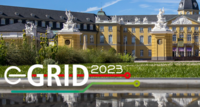 October 2023: 8th IEEE eGrid 2023 Workshop takes place at KIT October 2023: 8th IEEE eGrid 2023 Workshop takes place at KITThe IEEE eGrid 2023 Workshop will be held at KIT on 16th-18th October 2023. The eGrid2023 Workshop is a single-track industrial workshop where experts from industry and international labs will hold plenary speeches, tutorials, and panels on the last insights on theory, modelling, analysis, design and development, testing, and integration of power electronics-based power systems. Read more |
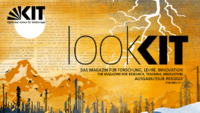 October 2023: Climate Change October 2023: Climate ChangeWhat Will the Future of German Forests Be Like? Climate change is associated with increasingly frequent droughts. This increases the risk of forest fires. On a walk through the forest, forest scientist Dr. Somidh Saha from KIT advocates more research and courage to experiment. KIT Highlight Topic |
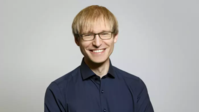 September 2023: Scientist of the month - Benjamin Schäfer (KIT) September 2023: Scientist of the month - Benjamin Schäfer (KIT)Benjamin Schäfer has headed the junior research group DRACOS (Data-driven analysis of complex systems) at KIT since 2022, where he also teaches as a tenure track professor. We talked to Benjamin Schäfer about his work. Helmholtz Interview |
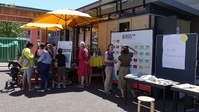 June 2023: Eucor MobiLab Roadshow 2023 Starts in Freiburg June 2023: Eucor MobiLab Roadshow 2023 Starts in FreiburgKIT's rolling participation lab on a three-country tour: Dialogue of science and society on a sustainable future in the upper rhine region. Press release 046/2023 |
| June 2023: Technology Assessment - KIT advises the Bundestag for another five years The Institute for Technology Assessment and Systems Analysis of the KIT will operate the Office for Technology Assessment at the German Bundestag for another five years. Press release 045/2023 |
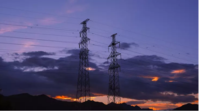 May 2023: Exploring the Braess Paradox May 2023: Exploring the Braess ParadoxA sustainable energy supply requires the expansion of electricity grids. However, new lines can also lead to grids becoming more unstable rather than more stable as expected. The phenomenon is called the Braess paradox. An international team, including experts from KIT and FZJ, has now simulated this in detail for electricity grids for the first time, demonstrated it on a larger scale and developed a prediction tool. Helmholtz Article (in German) |
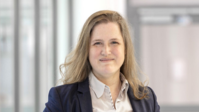 May 2023: Scientist of the month - Heidi U. Heinrichs (FZJ) May 2023: Scientist of the month - Heidi U. Heinrichs (FZJ)Heidi U. Heinrichs received the ERC Starting Grant from the European Research Council for the project "Material Realizable Energy Transformation - Navigating the Material Bottlenecks of a Carbon-Neutral Energy System" (MATERIALIZE). Helmholtz Interview |
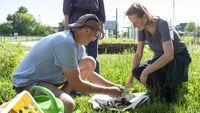 March 2023: Participation campaign - "Sustainable living and working? Challenge accepted!" March 2023: Participation campaign - "Sustainable living and working? Challenge accepted!"Together with KIT researchers, citizens of Karlsruhe are looking for ideas and solutions for sustainable living and working. Press release 012/2023 (in German) |
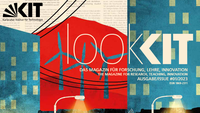 March 2023: lookKIT - Energy Efficient & Autonomous March 2023: lookKIT - Energy Efficient & AutonomousThe new issue of lookKIT is dedicated to the highlights from technology development that KIT will show at Hannover Messe 2023. Read, among other things, how a team of the KIT's Institute of Technical Physics (ITEP) simulates future energy supply at the Energy Lab 2.0. lookKIT 2023/1 |
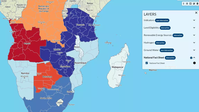 March 2023: Green hydrogen for energy transition March 2023: Green hydrogen for energy transitionIn the energy system of the future, Germany will have to import green hydrogen from other countries. The Research Centre Jülich (FZJ) has investigated the potential of sub-Saharan Africa and created a hydrogen atlas for Africa. Helmholtz Article (in German) |
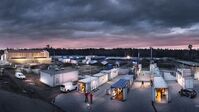 March 2023: KIT at Energy Solutions @ Hannover Messe 2023 March 2023: KIT at Energy Solutions @ Hannover Messe 2023From April 17 to 21, 2023, KIT will present selected highlights from the technological development at Energy Solutions (Hall 13, Booth C70): KIT's Energy Lab 2.0 will be the key issue: Europe's largest research infrastructure for renewable energies will focus on real-time systems for energy technologies, power-to-X, geothermal energy, and heat utilization, among others. Further information |
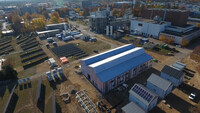 January 2023: Energy Lab - Model Lab for Energy Transition January 2023: Energy Lab - Model Lab for Energy TransitionIn Karlsruhe, Jülich and Stuttgart, scientists from three Helmholtz Centres are working together on technologies for the energy system of the future. To this end, they have built Europe's largest research infrastructure for renewable energies. Helmholtz Article (in German) |
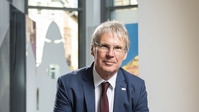 January 2023: Herculean task of transforming the energy system January 2023: Herculean task of transforming the energy systemA commentary by Holger Hanselka, President of KIT and Vice President of the Research Field Energy of the Helmholtz Association Helmholtz Article (in German) |
 January 2023: Hydrogen - Energy Carrier of Unlimited Potential? January 2023: Hydrogen - Energy Carrier of Unlimited Potential?Hydrogen Is the Most Abundant Element on Earth – and It Is Very Rich in Energy. Highly developed industrialized countries such as Germany require a clean, safe, and affordable power supply – the energy crisis shows this very clearly. Hydrogen might contribute to the solution, being the most abundant chemical element in the universe and on Earth. It offers virtually unlimited potential as a carrier of energy. KIT Topic Highlight |
News 2022
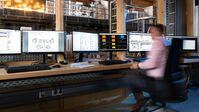 November 2022: New data infrastructure for energy system research November 2022: New data infrastructure for energy system researchWith the energy transition comes digitisation: in order to build and control the networked and climate-neutral energy system of the future with all its components, vast amounts of data are needed. The newly established National Research Data Infrastructure for Interdisciplinary Energy System Research (nfdi4energy) is intended to facilitate the exchange and accessibility of such data sets and thus accelerate research. KIT News |
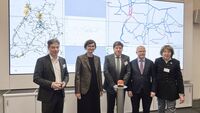 October 2022: Future Energy System: Federal Research Minister Starts Large-scale Simulation at KIT October 2022: Future Energy System: Federal Research Minister Starts Large-scale Simulation at KITWith the goal of climate neutrality in mind, KIT researchers of Energy Lab 2.0 have built a detailed “digital twin” of the German energy system. It integrates real technical plants, such as a solar park, grid storage systems, and power-to-X facilities, and can now be used to virtually test the future energy system with all its components. On October 28th, Federal Research Minister Bettina Stark-Watzinger started the simulation during her visit of KIT. Press release 096/2022 |
_rdax_200x112s.jpg) September 2022: Better prediction of fluctuating electricity demand and consumption September 2022: Better prediction of fluctuating electricity demand and consumptionA data-driven load model developed by KIT researchers improves planning and operation of power grids. KIT News |
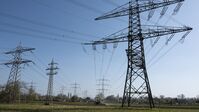 September 2022: Power supply - understanding unstable grids September 2022: Power supply - understanding unstable gridsIncreasing the capacity of existing lines or adding new lines may also reduce the overall system performance and even promote blackouts - prediction tool is published in nature communications. Press release 086/2022 |
_rdax_200x75s.jpg) 2nd International workshop on "Open Source Modelling and Simulation of Energy Systems" 2nd International workshop on "Open Source Modelling and Simulation of Energy Systems"From 27th to 29th March 2023, the second international workshop on "Open Source Modelling and Simulation of Energy Systems" takes place in Aachen. Deadlines for paper submission and registration can be found in the following link. Announcement |
 September 2022: "What matters is how the winter turns out" September 2022: "What matters is how the winter turns out"If the winter is mild, Holger Hanselka, President of KIT and Helmholtz Vice President for the Research Field Energy, believes it is likely that there will be no bottlenecks. For a very cold winter, he says, scenarios have to be developed now. In the medium and long term, he sees great potential in geothermal energy. Helmholtz interview |
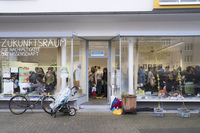 July 2022: How Real-World Labs Can Promote Societal Change Towards More Sustainability July 2022: How Real-World Labs Can Promote Societal Change Towards More SustainabilityIn some situations, humans do not act logically: We are against industrial livestock farming, but we buy cheap meat. We are eager to care for the environment and for our health and still use the car instead of the bicycle, even for short distances. We have a wealth of knowledge, but often fail in putting theory into practice – real-world labs at KIT dedicate their research to this gap between knowledge and action and try to close it. KIT topic highlight |
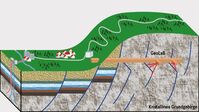 June 2022: GeoLaB - Future with Geothermal Energy June 2022: GeoLaB - Future with Geothermal EnergyKIT and Research Partners Set up the World’s First Underground Reservoir Simulator for Research on Deep Geothermal Energy. Press release 056/2022 |
 May 2022: More Resilience for Critical Infrastructures May 2022: More Resilience for Critical InfrastructuresResearchers from KIT are developing concepts for planning and operating future-proof utility and supply systems and are rresent at Hannover Messe 2022 from May 30 to June 2. Press release 050/2022 |
 April 2022: Five questions to...Benjamin Schäfer April 2022: Five questions to...Benjamin SchäferThe new research group "Data-driven analysis of complex systems for a sustainable future" headed by Benjamin Schäfer at the Karlsruhe Institute of Technology (KIT) is investigating how digitization, big data, and AI can contribute to the success of the energy transition. In an interview, the physicist explains how artificial intelligence will help make energy grids fit for the future and why he wants to turn the black box into a glass box. Helmholtz article |
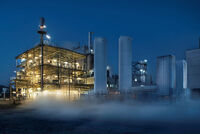 March 2022: Energy supply - The crisis must not be an alibi for less climate protection March 2022: Energy supply - The crisis must not be an alibi for less climate protectionIn an interview, we spoke with Holger Hanselka, Vice President for the Research Field Energy at the Helmholtz Association, about how great the dependence on Russian oil and gas is, what alternatives there are, and what he would like to see from policymakers. Helmholtz article |
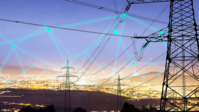 February 2022: Digitalization and AI - What will the energy supply of the future look like? February 2022: Digitalization and AI - What will the energy supply of the future look like?To achieve the energy transition, the energy system must be rethought. The key to this lies in digitalization. Scientists at the Helmholtz research centers are working together to unearth this digital treasure and make it usable for a clean future. Helmholtz article |
News 2021
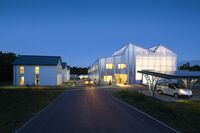 October 2021: Energy Transition: New Technologies for Sector Coupling October 2021: Energy Transition: New Technologies for Sector CouplingSmart networking, control, and optimization of power, heat, and gas supplies are the keys to a climate-neutral energy system. Karlsruhe Institute of Technology (KIT) possesses a unique research infrastructure for the transdisciplinary development and testing of new strategies and technologies for sector coupling on the prototype scale. On their way towards a new, holistic modeling system, researchers have now reached first milestones. The Federal Ministry of Education and Research (BMBF) has agreed to increase funding for the SEKO (sector coupling) real-world lab by EUR 10 million to a total of 16.5 million euros. Press Release 093/2021 |
 July 2021: See our new Video about the Energy Lab 2.0! July 2021: See our new Video about the Energy Lab 2.0!The overall mission of the large-scale research infrastructure Energy Lab 2.0 is to develop technological solutions for the energy system in 2050 in order to successfully integrate the renewable energies into the power grid. Especially by conducting technology-oriented research on a demonstrator scale and complementing it with comprehensive energy systems analysis. The "brain" of the Energy Lab is the Smart Energy System Simulation and Control Center (SEnSSiCC). From here, many of the Energy Lab systems can be controlled. All relevant data is collected here. The SEnSSiCC laboratory of the Institute for Automation and Applied Informatics (IAI) and the Institute of Technical Physics (ITeP) consists of five sub-labs, which are linked to each other by data and power technology and enable large-scale experiments in the range of 1.4 MW. Video on YouTube |
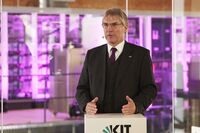 April 2021: The Amazing Field of Science: Bioeconomy to End the Ecological Crisis April 2021: The Amazing Field of Science: Bioeconomy to End the Ecological CrisisPopulation growth and the increasing standard of living make our society face big ecological challenges: Climate change, littering of the seas, dwindling agricultural areas, resource scarcity. Bioeconomy aims at replacing fossil by regenerative resources and at using advanced and sustainable technologies based on biological knowledge and principles. Visions and questions relating to bioeconomy, the subject of the current science year, were in the focus of the first digital annual celebration of Karlsruhe Institute of Technology (KIT). Press Release 36/2021 |
 March 2021: Karlsruhe Real-world Lab for Sustainable Climate Protection March 2021: Karlsruhe Real-world Lab for Sustainable Climate ProtectionFrom the Federal Climate Protection Act to alternative drive systems and renewable energies to Fridays for Future and personal behaviors: Many people have long since become aware of the importance of climate protection. With the “Karlsruhe Real-world Laboratory for Sustainable Climate Protection (KARLA),” Karlsruhe Institute of Technology (KIT), the city of Karlsruhe, Karlsruhe University of Applied Sciences, and other partners will move this topic even more into the focus of the society’s daily life and study selected local climate protection measures. The project is funded with EUR 1.1 million by the Baden-Württemberg Ministry for Science, Research, and the Arts. Press Release 17/2021 |
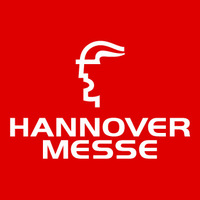 March 2021: Hannover Messe 2021: KIT Showcasing Selected Highlights of Technology Development at Two Virtual Booths from April 12 to 16 March 2021: Hannover Messe 2021: KIT Showcasing Selected Highlights of Technology Development at Two Virtual Booths from April 12 to 16A plant-inspired anti-reflective film, a flexible production system for individualized products, a digital assembly assistant, the world's smallest transistor, and climate-neutral synthetic fuels. Karlsruhe Institute of Technology (KIT) will present these and other research and innovation topics at the Hannover Messe 2021. At the digital event from April 12 to 16, the KIT will showcase selected highlights at the virtual booths "Future Hub" and "Energy Solutions". An overview will be provided by the two live streams on April 13, 2021, from 11:00 a.m. to 11:25 a.m. on the "Future Hub" and on April 14, from 10:30 a.m. to 10:55 a.m. on "Energy Solutions". Press Release 27/2021 |
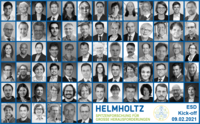 February 2021: ESD Kick-off Meeting February 2021: ESD Kick-off MeetingAt their first meeting on February 09th, 2021, over 160 researchers from eight Helmholtz centres, from the four Helmholtz energy programs and also other Helmholtz research fields came together to officially start into the new Helmholtz program “Energy System Design” (ESD). The participants of the webmeeting exchanged on the Topics and Cross-Topic Activities within ESD, discussed the details of cooperation with the Helmholtz program FUSION and the Helmholtz Energy Transition Roadmap (HETR) and jointed in seven selected workshops on various energy research interests. |
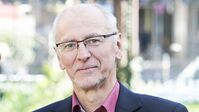 February 2021: Armin Grunwald appointed to German Ethics Council February 2021: Armin Grunwald appointed to German Ethics CouncilIn accordance with the proposal of the Federal Government, he was appointed to the German Ethics Council by the President of the German Bundestag, Dr. Wolfgang Schäuble, with effect from 14 February 2021. Professor Grunwald is head of the Institute for Technology Assessment and Systems Analysis (ITAS) and holds the Chair of Philosophy and Ethics of Technology at the Karlsruhe Institute of Technology (KIT). He also heads the Office of Technology Assessment at the German Bundestag. He will attend a Plenary Meeting of the German Ethics Council for the first time on 25 February 2021. KIT News |
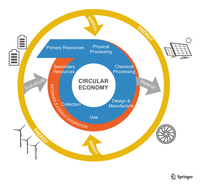 February 2021: Kick-off Meeting Energy Transition and Circular Economy (Innovationspool) February 2021: Kick-off Meeting Energy Transition and Circular Economy (Innovationspool)Researchers from the two new Helmholtz programs ESD and MTET are pooling their expertise in the new Innvoationspool project "Energy Transition and Circular Economy" and will start the next two years with the kick-off meeting on March 4, 2021. The project aims to develop methods and models for the design and operation of energy-intensive recycling processes and their associated grid and (material) value chain integration. The aim is to close material and energy cycles as comprehensively as possible and to operate industrial production on the basis of renewable electricity in a way that is beneficial to the grid and economical. This is achieved through the cross-disciplinary, cross-center and cross-program collaboration of the partners involved. |
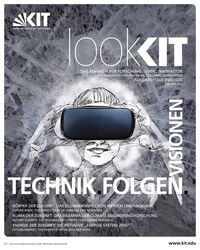 lookKIT 2020/4: Technology. Impacts. Visions lookKIT 2020/4: Technology. Impacts. VisionsToday's society is dependent on technology - and on the fact that it is constantly evolving. It is the task of science to explore technical visions and implement them, to assess the opportunities and risks of new technologies, and to investigate the impacts of innovations already used in everyday life. At KIT, scientists in numerous disciplines work on technologies and concepts that drive technical and social progress. This issue of lookKIT presents some of these projects and approaches: from peacemaking machines to climate engineering strategies to the concept of technology futures. lookKIT 2020/4: Technology. Impacts. Visions |
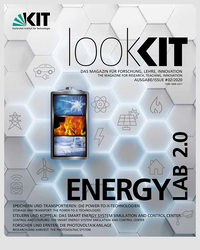 lookKIT 2020/2: Energy Lab 2.0 lookKIT 2020/2: Energy Lab 2.0Superlatives should be used carefully. Still, I would like to share with you details about the unique character of the Energy Lab 2.0. Together with our partners, the German Aerospace Center and Forschungszentrum Jülich, KIT – The Research University in the Helmholtz Association has succeeded in establishing the only infrastructure of this kind in Germany. As part of projects funded by the State of Baden-Württemberg and the Federal Ministries of Education and Research and for Economic Affairs and Energy, the interaction of components for future energy systems is studied and new approaches to stabilizing energy grids are tested. The Energy Lab 2.0 combines electric, thermal, and chemical energy flows as well as new information and communication technologies. LookKIT 2020/2 Energy Lab 2.0 |

